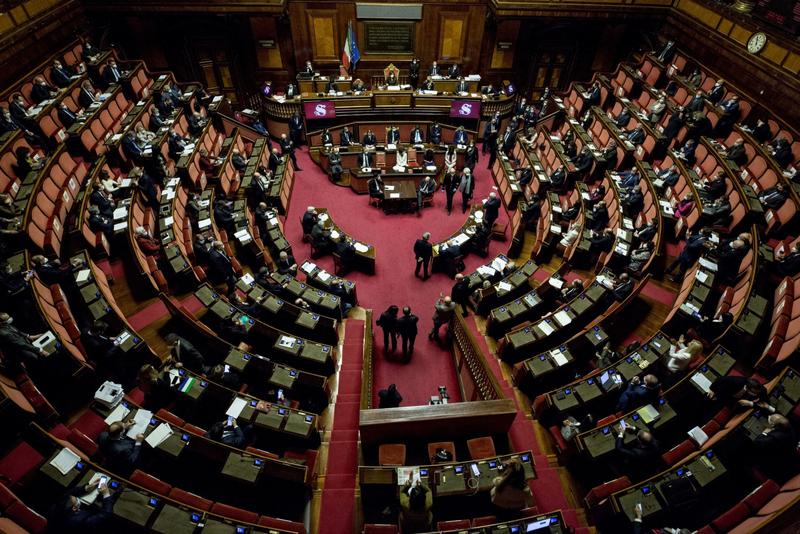 Italy's Senate, the upper house of parliament, stands during Giuseppe Conte, Italy's prime minister's debate in Rome, Italy, Jan 19, 2021. (ALESSANDRA BENEDETTI / CORBIS / BLOOMBERG)
Italy's Senate, the upper house of parliament, stands during Giuseppe Conte, Italy's prime minister's debate in Rome, Italy, Jan 19, 2021. (ALESSANDRA BENEDETTI / CORBIS / BLOOMBERG)
Talks aimed at building support for a new Italian government will continue, after consultations over the weekend failed to produce an agreement on a new government and end the political deadlock that forced the resignation of Prime Minister Giuseppe Conte.
The departure of Matteo Renzi, also a former PM, robbed the govt of its parliamentary majority and precipitated PM Giuseppe Conte’s resignation
The speaker of the lower house of parliament, Roberto Fico, said Sunday afternoon that talks with the outgoing coalition parties would resume the following day. Fico has until Tuesday to report back to President Sergio Mattarella, on who will be handed the task of forming a new government.
ALSO READ: Italy's Renzi 'may seek new finance chief to back Conte'
The range of possible solutions is thinning, and could include a new cabinet led by Conte and backed by the same parties but with different ministers, or a new government led by an institutional figure. Matteo Renzi would back former European Central Bank Governor Mario Draghi for prime minister, Italian newspapers have reported. Mattarella has not discussed this possibility with Draghi, according to an official close to the president, who asked not to be identified.
“We will not accept and end to the crisis without a solemn, written, commitment over the issues,” Renzi, whose tiny Italy Alive party quit Conte’s administration this month, said in an interview with Corriere della Sera Sunday.
Economic clash
The departure of Renzi, also a former prime minister, robbed the government of its parliamentary majority and precipitated Conte’s resignation. Renzi pulled out over disagreements about how to spend the 209 billion euros (US$250 billion) of European Union recovery funds that aim to ease the economic fallout of the coronavirus, which has been particularly grim in Italy. While his party represents only 3 percent of total votes, his support to a government is crucial to reach a majority in parliament.
Renzi may also push for Finance Minister Roberto Gualtieri to be replaced as part of his quest to have a bigger say over the country’s finances in any new government, according to people familiar with the talks.
A new administration would need the support of the Democratic Party and the Five Star Movement, the biggest stakeholders in the outgoing coalition. Both parties have signaled they would be open to a new alliance with Renzi if Conte remains as premier. According to party officials, a written commitment from the parties could resolve the conflict.
Conte, a 56-year-old lawyer with little political expertise, resigned on Jan 26, days after Renzi’s departure, plunging the country into renewed political uncertainty as it battles the pandemic and a deep recession. Italy was initially the center of the COVID-19 outbreak in Europe and has suffered more than 88,000 deaths from the virus. Restrictions aimed at curtailing the spread led the economy to contract more than 9 percent last year, according the International Monetary Fund.
READ MORE: Italy's Conte appeals again for backing to form new govt
For Conte, the current crisis marks the second time that he has seen his coalition unravel. The first came when Matteo Salvini of the anti-migrant League abandoned his first administration in 2019. If Conte can maneuver a comeback, it would be his third stint as premier since the last general elections in the country in 2018. Salvini and his allies on the right have been pushing for new elections in the hope they could unseat the Democrats and Five Star.
According to a poll published by Corriere della Sera on Sunday, about 40 percent of Italians would be in favor of a new government led by Conte, but 36 percent would prefer a different leader. Only 28 percent of the people polled by Ipsos see a new election as the best outcome for the political crisis.



